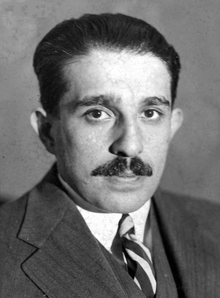- Marian Hemar
-
Marian Hemar 
Born Jan Maria Hescheles
April 6, 1901
LwówDied February 11, 1972 (aged 70)
Dorking, United KingdomOccupation writer Language Polish Nationality Polish Ethnicity Polish Jew Marian Hemar (1901–1972), born Jan Maria Hescheles, also Jan Mariański , Marian Wallenrod, was a Polish Jewish poet, journalist, playwright, comedy writer, and songwriter: he himself said that before the outbreak of World War II he had written 1200 songs[1] including hits like Może kiedyś innym razem (Maybe Some Other Time) and Upić się warto (Let's get drunk).
Hemar (a pseudonym formed from the first two letters of his last name and the first three letters of his middle name) was born on April 6, 1901, in Lwów. He studied medicine and philosophy at the local university and took part in the fights for the city in 1918 and 1919 as a volunteer on the Polish side. At the invitation of Jerzy Boczkowski, director of the legendary Qui Pro Quo Theatre, he left for Warsaw in 1924; by 1925 when he moved to Warsaw, he was already a well-known author, working at the Qui Pro Quo cabaret with Julian Tuwim. He was a key figure in the Banda, Morskie Oko, and Cyrulik Warszawski ("Barber of Warsaw") cabarets and author of hundreds of Polish Radio sketches.[1] He also wrote shmontses (szmonces) (Jewish jokes, monologues and sketches), and jointly composed political sketches with poets Julian Tuwim and Antoni Słonimski.[2]
His unhappy love affair with the Warsaw diseuse Maria Modzelewska inspired many of his songs including Chciałabym, a boję się (Happy Days Are Here Again, aka I'd Love To Do It, but I'm Afraid)[3]
Soon after the outbreak of World War II Hemar fled Warsaw after being searched for by the Gestapo and reached Romania, and eventually the Middle East, where he signed up and served in the Polish Independent Carpathian Rifle Brigade. During the war he continued his literary activity, organizing concerts, speeches and field theater plays for Polish troops. He also organized one of the few theaters operating in besieged Tobruk.
He was called "The bard of Lvov, the troubadour of the London emigration". For 16 years (1953-1969) he prepared and presented weekly cabaret programmes for Radio Free Europe, in which - in prose and verse - he commented upon all the important news from post-war Poland.[1]
After the war, Hemar was unable to return to communist Poland due to the persecution by the Polish authorities of all persons who were politically active. In 1939, he left for Palestine but settled in England in 1941,[2] becoming one of the best-known figures in the Polish diaspora. He continued to be popular in Poland with his weekly program broadcast by the Polish section of the Radio Free Europe.
Hemar died on February 11, 1972, in Dorking, Surrey (near London), and was buried at the local cemetery, although there are plans to move his remains to Poland.
Miscellanea
Hemar's mother was the sister of Stanisław Lem's father.[4]
References
- ^ a b c http://www.polartcenter.com/Marian_Hemar_W_Warszawie_1924_1939_p/9700150.htm Polish Art Center bio
- ^ a b http://www.yivoencyclopedia.org/article.aspx/Hemar_Marian%7CYIVO article on Marian Hemar by Eugenia Prokop-Janiec
- ^ http://www.youtube.com/watch?v=a3to5aAYqF4%7CBiographical discussion in notes of Hemar song Może kiedyś (Innym razem)
- ^ Lem's FAQ
Categories:- Polish cabaret performers
- 1901 births
- 1972 deaths
- People from Lviv
- Jews from Galicia (Eastern Europe)
- Polish Jews
- British people of Polish descent
- Polish poets
- Radio Free Europe people
Wikimedia Foundation. 2010.

